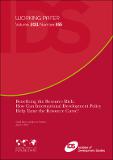| dc.contributor.author | Havro, Gøril | |
| dc.contributor.author | Santiso, Javier | |
| dc.date.accessioned | 2011-05-19T15:10:30Z | |
| dc.date.available | 2011-05-19T15:10:30Z | |
| dc.date.issued | 2011-03 | |
| dc.identifier.citation | Havro, G. and Santiso, J. (2011) 'Benefiting the Resource Rich: How Can International Development Policy Help Tame the Resource Curse?', IDS Working Paper 355, Brighton: IDS | en_GB |
| dc.identifier.uri | https://opendocs.ids.ac.uk/opendocs/handle/20.500.12413/893 | |
| dc.description.abstract | While natural resource revenues ought to enable development, past experiences with the ‘Paradox of Plenty’ have shown that mineral and oil wealth often represents a curse rather than a blessing, inducing slower growth and higher levels of poverty. Many resource rich countries have high poverty rates and are among recipients of international aid. This paper looks at how lessons from successful resource rich countries can provide lessons for resource management. It also considers how international donors can act to facilitate such processes. Norway and Chile are small open economies with high concentration in petroleum and copper, respectively. Yet the interaction between good institutions and fiscal policy, facilitated by the use of resource funds, has allowed both countries to largely escape the resource curse. Both countries have prioritised institutional development before engaging in heavy resource extraction. Maintaining a broad tax base, developing linkages to the rest of the economy, investing in human capital, and engaging in political consensus-building have helped retain incentives that limit rent-seeking. Many countries facing high inflows of natural resource rents also have weak institutions. For these countries, strengthening institutions through developing the skill and efficiency of civil servants and committing to transparency and accountability can help change the pay-offs from engaging in corrupt practices or rent-seeking. Yet in many cases, large-scale institution building might be beyond these countries’ immediate capacity, leaving an important opportunity for international donors. Aid, in the traditional sense, is not the solution to the resource curse. Once the natural resource revenues have started flowing, resource rich countries are not primarily in need of further financial inflows. Fostering long-term development here is rather a question of technical support and capacity building, support for international anti-corruption mechanisms and imposing transparency and legal requirements on national companies operating in these countries. | en_GB |
| dc.language.iso | en | en_GB |
| dc.publisher | Institute of Development Studies (UK) | en_GB |
| dc.relation.ispartofseries | IDS Working Paper;356 | |
| dc.rights.uri | http://www.ids.ac.uk/files/dmfile/IDSOpenDocsStandardTermsOfUse.pdf | |
| dc.subject | Governance | en_GB |
| dc.subject | Aid | en_GB |
| dc.subject | Poverty | en_GB |
| dc.title | Benefiting the resource rich: how can international development policy help tame the resource curse? | en_GB |
| dc.type | IDS Working Paper | en_GB |
| dc.rights.holder | Institute of Development Studies | en_GB |
| dc.identifier.externaluri | http://www.ntd.co.uk/idsbookshop/details.asp?id=1212 | en_GB |
| dc.identifier.blds | 321532 | |

